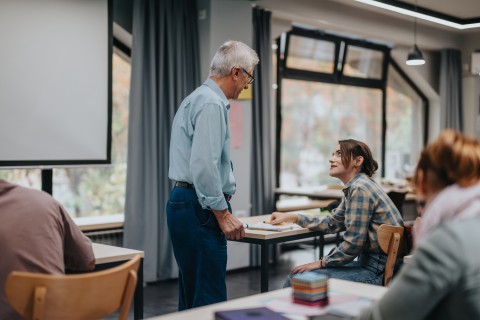
This fall, a new course in the College of Design offers Georgia Tech students an extraordinary opportunity to use design methods not just as tools for innovation — but as a means of human connection. Led by Associate Professor Leandro Miletto Tonetto in the School of Industrial Design, ID 4843: Applied Design Methods for Community Well-being invites undergraduate students to step beyond the classroom and into the lives of older adults experiencing cognitive decline, where design meets care and empathy fuels creativity.
Supported by a 2025–2026 Transformative Teaching and Learning Innovation Incubator Grant from Georgia Tech’s Center for Teaching and Learning, this course takes experiential learning to the next level. It’s rooted in a partnership with A.G. Rhodes, one of Georgia’s oldest nonprofit senior care organizations, and the newly renamed SimTigrate Design Center (formerly SimTigrate Design Lab), where interdisciplinary collaboration drives design for health and wellness. The SimTigrate Design Center is also an affiliated center of Georgia Tech’s Institute for Neuroscience, Neurotechnology, and Society, further strengthening its commitment to advancing human-centered design in complex healthcare environments.
“Students will get a full hands-on experience designing products and environments that support horticultural therapy,” said Tonetto. “Everyone knows that this kind of therapy is effective. But what could make it even better? That’s the open-ended design problem we’re tackling.”
Horticultural therapy — using plant-based and plant-based activity as a therapeutic intervention — is at the heart of this first iteration. At A.G. Rhodes, residents participate in music and plant-based activities that stimulate cognitive function and foster joy. For students, the experience will push their design thinking beyond the studio.
“Design methods are mostly about understanding people’s needs,” Tonetto said. “In this course, students will be observing residents during therapy, conducting advanced interviews, and learning how to gather insights in more complex, real-world situations. We’re going way beyond the basics.”
Cross-School Collaboration, Real-World Impact
The course is also a collaborative effort across schools. Faculty from Architecture (Professor Hui Cai) and Building Construction (Professor Eunhwa Yang) are supporting parallel research projects at A.G. Rhodes, while Ph.D. student Ibrahim Bilau and MID student Yiran Wang contribute to the project from the School of Building Construction and the School of Industrial Design, respectively.
“It’s a perfect example of how design, architecture, and construction can work together for social good,” Tonetto noted.
That multidisciplinary approach is at the heart of the College of Design’s mission — and why this course stands out as a signature learning experience. Tonetto is keeping the inaugural section intentionally small (fewer than 20 students) to provide close mentorship and ensure thoughtful, supported interactions with residents.
“These students will leave with real-world design experience, yes—but also a much deeper understanding of ethical design,” Tonetto said. “They’ll learn that good design isn’t just about solving a problem. It’s about dignity, dialogue, and shared meaning.”
Why It Matters
At a time when students are seeking purpose-driven education, this course offers something rare: the chance to make a tangible difference in someone’s life while still in school.
“We want students to see that their skills can do more than land a job,” Tonetto said. “They can change lives.”
About A.G. Rhodes
A nonprofit senior care organization with three locations in metro Atlanta, A.G. Rhodes is known for its progressive approach to long-term care, including memory care, rehabilitation, and therapeutic programs like horticultural and music therapy. Learn more at agrhodes.org.
About Leandro Miletto Tonetto
Tonetto is an Associate Professor in the School of Industrial Design with a background in psychology and 20 years of global experience in human-centered design. He leads research at the intersection of design, health, and well-being, and serves as convenor of the Design Research Society’s SIG on Well-being, Happiness, and Health.
Melissa Alonso
Assistant Director of Communications
College of Design
